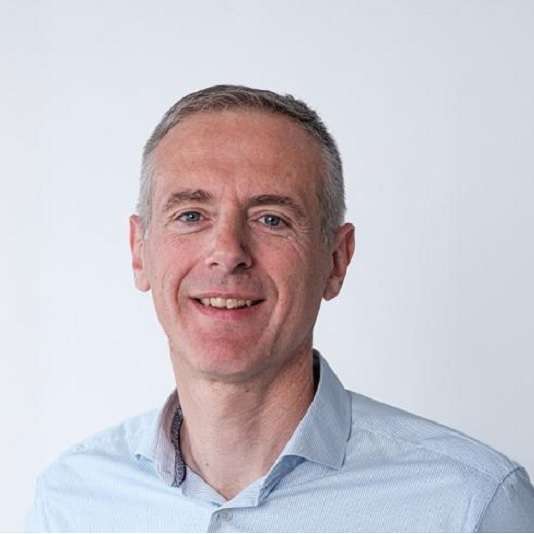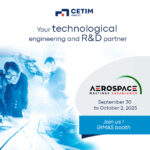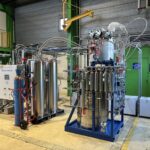In few weeks, the International Paris Air Show opens at Le Bourget, France.
What is the impact of additive manufacturing in aeronautics, space and defense, and how is Cetim contributing to the expansion of these technologies in these sectors?
Benoît Verquin, our Fellow Expert in additive manufacturing, answers 3 questions on the subject.
What are the main challenges of metal additive manufacturing for the aerospace industry?
Metal additive manufacturing is revolutionizing the way parts are designed, and enabling optimized functionalities on a number of fronts: part lightweighting, assembly reduction, fluid-thermal optimization… The aeronautics and space sectors are reaping the benefits in terms of reduced mass and fuel consumption. For example, Cetim’s teams have produced an air-oil heat exchanger in partnership with the French company Sogeclair, an expert in this field, to be showcase at the Paris Air Show. This type of component offers compactness gains of up to 30%, and a weight reduction of 20 to 30%, for performances equivalent to those of a traditional solution. But it’s when the design possibilities are fully exploited that additive manufacturing stands out from traditional processes. To achieve this, we need to support the training of young technicians and engineers. This is the aim of our +20 Cetim Academy’s training courses dedicated to this field.
In addition, the research carried out over the last decade on the materials used in additive manufacturing has led to a better understanding of these processes, paving the way for the development of dedicated alloys that take advantage of the material’s specific transformation kinetics, to produce more mechanically resistant materials or with higher temperature resistance, which are in demand for the new generations of rocket engines and launchers.
Auber & Duval, for example, has recently developed various alloys for use in additive manufacturing, enabling them to withstand very high temperatures, such as ABD-1000AM, which can work in environments of 1 000°C or more after age-hardening.
Constellium, for its part, has developed the CP1 aluminum alloy specifically for the PBF-LB process. After a simple annealing treatment, the alloy offers mechanical properties superior to those of AlSi10Mg or 6061. It is also compatible with a wide range of surface treatments and has excellent thermal conductivity and corrosion resistance.
In these sectors, many applications require larger machine sizes to manufacture larger components or more components in a single production run. Space applications are particularly demanding, especially for certain launcher engine components. That’s why AddUp has launched the Massif (Metal Additive System, Sustainable, Industrial, Eco-Friendly) project, which aims to design a large-scale PBF-LB machine with a printing volume 12 times larger and 300% higher productivity (up to 1.5m x 1.5m x 2.0m). In particular, this machine will provide a response to sovereign markets. Cetim is supporting them in this new challenge.
Further challenges lie in the qualification of these special processes. Qualification procedures have a major impact on application development costs. That’s why we’re also working on various projects to harmonize the qualification process and develop standards to harmonize best practices.
What is Cetim’s expertise in this field?
We bring our experience in the use of manufacturing processes across the entire value chain, from product design to part inspection. Our teams work from development to optimization of manufacturing parameters, right through to product industrialization. For over 20 years, we have been carrying out studies and projects on a wide range of processes, including powder bed fusion, DED arc-wire or DED laser-powder deposition processes, as well as processes using sintering as a consolidation mode, such as Binder Jetting. This enables us to guide manufacturers towards the right manufacturing solution for their specific requirements.
We are also actively involved in international standardization in conjunction with UNM, through our participation in TC ISO 261, where we lead the WG 3 working group on test methods. Our contributions to standardization work enable us to support manufacturers in various fields towards the qualification of their products.
In addition to the technical and economic aspects, we integrate the environmental impact of these new processes into our support approach. Life cycle assessments (LCA) carried out on 3 main metal AM processes (PBF-LB, DED arc-wire, MBJ) enable us to carry out LCA on products over their entire life cycle, including the use phase. This was recently done on behalf of the French space agency CNES for launcher components, in order to optimize their eco-design approach.
With the help of GIS CNRS Head, the Manufacturing branch of the Carnot Insitut, Addimalliance, Initiative 3D and Additive Factory Hub (AFH), we are also leading the Metal Additive Manufacturing community through various initiatives, including the international METAL AMS 2026 congress, which will take place on March 25 and 26, 2026 at Cetim in Senlis. It will provide an opportunity to review the latest advances in scientific work and industrial applications.
We are also carrying out a number of R&D projects for Cetim’s members compagnies, through specific transversal R&D project named “Affordable metal additive manufacturing” (PTT Famca). The aim is to identify the most affordable manufacturing technologies for mechanical SMEs. Work is in progress and is being followed by over 300 companies.
What resources does Cetim provide for manufacturers?
To support manufacturers in developing their applications and mastering these processes, we have technological platforms where we share resources. In Bourges (France), the Printing Bourges platform was set up jointly with MBDA and KNDS for the defense and aeronautics sectors. Its aim is to create a sovereign subcontracting sector capable of producing mass-produced parts using metal additive manufacturing, in collaboration with prime contractors. Operated by Cetim, with its own capacities combined with the resources of its partners, it enables to carry out collaborative studies, whether on upstream subjects or industrialization projects, and to support SMEs in starting up series production.
We also integrate significant resources into our platforms, such as the NXG 600 laser melting machine and, in the near future, a friction stir deposition machine (MELD), which enables high deposition rates of up to 10 kg per hour for aluminum alloys. All this equipment enables us to provide solutions tailored to the needs expressed by manufacturers.




